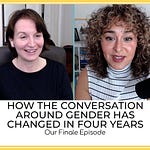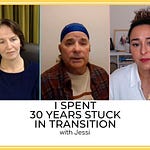We have completed eleven interviews and today we analyze the second half of our Pioneers Series. Stella and I discuss the psychological and emotional impact of some recent interviews. We review the shocking discussions we’ve had with several of our guests and reflect on the flawed Dutch Protocol, which is often held up as the gold standard in childhood dysphoria medical treatment. Dr. Anne Lawrence’s reflections on Autogynephilia and the extreme measures she feels some might take are discussed in the context of the Dutch researcher’s interview. We also think back about the role Az Hakeem’s groups will play when we examine this period in hindsight, years down the line. Perhaps Susan Bradley is right about ASD being a large explanatory factor in understanding gender dysphoria more broadly. We also look at the Samoan Prime Minister’s response to the Olympic Weightlifting competition: arguably the leaders of integrating male femininity into their society, the Samonas had sharp words for the Pacific Games Council’s admission of trans MtF lifter, Laurel Hubbard, in competing against two Samoan women.
We’re wrapping up this season and we’ll be returning to our regular weekly programs with our next episode on May 20th. If you are a Patron, thank you! And don’t fret: we’ll continue recording our weekly Q&As and posting them on Patreon. Thanks for listening!
Extended Notes
Stella and Sasha, being therapists, naturally ask questions to gain understanding of one’s thinking. They talk about the psychological and emotional toll this series had on them.
They first analyze their conversation with Thomas Steensma and Annelou de Vries. Sasha shares what stood out to her.
Stella also touches on her thoughts and why she sees avoidance tactics as anti-psychological.
They explain what the gender dysphoria scale is all about.
The entire premise of the puberty blockers experiment is based on the so-called success of the gender dysphoria scale. They both share their disagreements with these methods.
Sasha talks about the unethical assumptions made with their studies.
They move on to analyze their conversation with Anne Lawrence and how both their mouths dropped when she talked about castration.
Stella asks why obsession is not being brought into this rather than just focusing on it as a gender identity topic.
Sasha shares her thoughts about the dismissive counseling she has noticed in general.
They both talk about their understanding of the depth of Anne’s suffering through her experience.
Sasha evaluates Anne’s actions and responses as an obsession to a rejection of a body part, which is common in most Aspy people.
Stella thinks there is still so much to be done on autistic diagnosis brainwork and she is looking forward to the next 15‒20 years.
Everyone has a very high regard for the Dutch model, implying that they are being very careful but they both disagree.
Sasha recalls how Steensma and de Vries may have perceived them as activists in their line of questioning.
Stella and Sasha share more feedback about the Dutch study if they truly wanted it to be neutral and inclusive.
What if the whole premise of the gender dysphoria scale is flawed? Sasha asks in retrospect.
We shouldn’t really change something unless we have a really clear understanding of what the current state of affairs is. Stella reflects on this against puberty blockers.
They share how off-putting it was for them to talk about the human body in a flippant manner.
What if Jazz Jennings was put on this gender dysphoria scale? Stella and Sasha talk about their disappointment further.
Stella mentions Az Hakim and how she admires his approach vs. the rigid coldness of the so-called experts.
Psychotherapy vs. Bodily Autonomy. Sasha compares the difference between their approach and their guests in this series.
Psychology is very powerful and Sasha believes that we have a lot of opportunities to make our own future regardless of transitions.
Stella believes the truth is the best way and there can be real merit in having people of all different types be part of therapy circles in these studies.
They also talk about Paul Vascher and how he has shown them a community that has managed to integrate gender nonconformity.
The difference in Samoa is that they don’t medicalize gender identity which makes the levels of gender dysphoria much lower.
Medical model vs. developmental model. They exchange thoughts on this further.
They also share their thoughts about the Samoan Prime Minister’s statement about the Pacific Games Lifting.
Stella and Sasha talk about taking some time off and a bit of what they plan to do when they come back!
This podcast is sponsored by ReIME and Genspect. Visit Rethinkime.org and Genspect.org to learn more.
For more about our show: Linktr.ee/WiderLensPod











